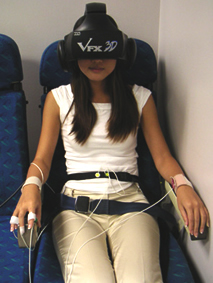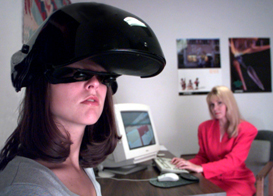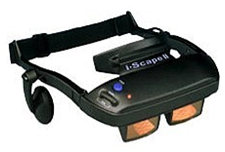The Virtual Reality Medical Center Facilities
Laboratory
The Virtual Reality Medical Center (VRMC) maintains a 10,000 square foot clinic in San Diego, California, a 1,000 square foot clinic in West Los Angeles, California, and a 600 square foot clinic in Palo Alto, California. The VRMC Virtual Reality Engineering Lab is located in a 1,700 square foot space in the same office complex as the San Diego clinic. Two additional clinics are located at Naval Medical Center San Diego and Camp Pendleton, California, and future clinics are in development. VRMC also maintains a 2,000 square foot research, development, and manufacturing facility in Orlando, Florida. The Virtual Reality Medical Institute is an affiliated European corporation located in Brussels, Belgium.
Clinical
|
Participant wearing HMD and physiological sensors. |
Current clinical space at VRMC San Diego includes 12 VR treatment rooms with virtual reality software for the treatment of fear of flying, driving, public speaking, heights, claustrophobia, agoraphobia, panic disorder, social phobia, posttraumatic stress disorder, body dysmorphic disorder, eating disorders, autism, attention deficit hyperactivity disorder (ADHD), anger management, and generalized social phobia. It also includes distraction software geared toward painful medical procedures; a clinical trials center for conducting drug studies; 6 noninvasive physiological monitoring labs (2 rapid prototyping labs for human interface sensors and 2 brain facilities), 12 noninvasive labs that measure EEG, ECG, EMG, EOG, skin resistance, temperature, respiration, heart rate variability, blood pressure, and pulse oximetry; a human-robotics interaction lab; and a multi-user VR facility. It has been approved and certified by the State of California as a patient care facility. It has also been approved by the Food and Drug Administration (FDA) and the Centers for Medicare and Medicaid Services (CMS) for government patient-care reimbursement.
Located near the University of California, San Diego (UCSD), Camp Pendleton, Miramar Marine Corps Air Station, Naval Health Research Center, Naval Medical Center San Diego (Balboa Naval Hospital), and Coronado Naval Air Station, the San Diego clinic is located within a 40,000 square foot office building.
A typical therapy room consists of a VR computer and head-mounted display (HMD), a physiological monitoring computer with noninvasive sensors, and some type of augmented reality device. In the case of driving, the patient sits in an actual automobile seat and uses a steering wheel, brake, and gas pedal. VRMC specializes in the creation of augmented reality environments that are used to increase levels of immersion and presence for patients undergoing therapy. VRMC also has significant experience in the development of noninvasive medical sensors, and has produced a number of PC-based portable medical devices that have been approved by the FDA. In particular, we have developed a variety of contact sensors based on piezoelectric formats that simultaneously record acoustic, displacement, and electrical activity.
Animal
Not applicable.
Computer
All key personnel in this project have their own offices and adequate computer equipment/software/ printers/faxes to support this project. See, under Other Resources below, additional computer capabilities to support virtual environment design.
Office
VRMC has about 300 sq. ft. of office space, composed of a large office for the Principal Investigator and several offices for support personnel. It is located in the s
|
Brenda Wiederhold, Ph.D., MBA, BCIA, with participant wearing HMD. |
ame building as the VRMC clinic, so the PI will be easily available to train personnel in treatment methods and oversee the clinical portion of the project. The VRMC Virtual Reality Engineering Lab is also located in the same complex as the offices for easy access and management.
Other Resources
VRMC currently is involved in research, clinical services, and training. VRMC trains 20–30 graduate students each year who are working towards doctorates in clinical psychology, health psychology, industrial and organizational psychology, applied psychophysiology, biomedical engineering, bioengineering, computer science, and digital arts. Student exchange programs are in place with Hanyang University, Seoul, Korea; the Catholic University, Milan, Italy; Jaume I University, Valencia, Spain; the University of California, Los Angeles (UCLA), Stanford University, and the University of Ottawa. VRMC also trains students from UCSD, San Diego State University, and the California School of Professional Psychology at Alliant International University, San Diego.
VRMC serves as a beta test site for virtual reality software and physiological monitoring equipment jointly developed in Canada, Italy, Korea, Spain, and the United States. We have applied standardization to our products by obtaining ISO 9001:2000 and ISO 13485:2003 certification, with CMMI (Capability Maturity Model Integration) Level 3 certification from Carnegie Mellon University’s Software Engineering Institute (SEI) under way. ISO 13485:2003 is a quality management standard for medical devices, while CMMI is focused on the quality of the software development process. In addition, VRMC is in the process of preparing for inspection as it comes into compliance with the Food and Drug Administration (FDA) Quality System Regulation (QSR) for medical devices.
Current research under way at the clinic includes understanding and quantifying the physiological correlates of stress, anxiety disorders research, eating disorders (anorexia, bulimia, binge-eating, and obesity), peak performance training, executive coaching, student state learning, distraction during painful procedures, ADHD, autism, and health promotion/disease prevention of diabetes, asthma, and teen smoking. In addition, telehealth projects are being conducted using avatars, Internet-based virtual worlds, video cameras, and microphones to treat social phobia and agoraphobia.
|
A low-cost HMD |
Drs. Brenda and Mark Wiederhold are on faculty at UCSD and have access to the San Diego Supercomputer Center and Brain Imaging Facilities (PET, MRI, fMRI, and CT) located on the campus. Dr. Mark Wiederhold is a member of the Scripps Clinic Medical Group and has access to the General Clinical Research Center (GCRC) at Scripps Clinic Torrey Pines. The GCRC is a 10-bed NIH-funded clinical research facility with a 1,000 square foot clinical laboratory that is capable of conducting any clinical or research protocol. In addition, the facility is staffed by registered nurses and other healthcare professionals who are specifically trained in the conduct of clinical trials.
Our current active research programs continue to attract local, state, and national funding. The facilities at VRMC meet the environmental laws and regulations of federal, State of California, and local governments for airborne emissions, waterborne effluents, external radiation levels, outdoor noise, solid and bulk waste disposal practices, and handling and storage of toxic and hazardous materials.


